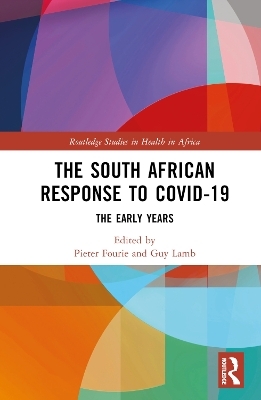
The South African Response to COVID-19
Routledge (Verlag)
978-1-032-28007-3 (ISBN)
This book analyses the first two years of South Africa’s response to the COVID-19 epidemic, from its emergence in early 2020.
Drawing on the perspectives of a range of public health experts, economists and other social scientists, and development practitioners, this book argues that understanding this early response will be essential to moderate and improve future policy thinking around health governance and epidemic readiness. This book provides a systemic analysis of not only the epidemiological progression of COVID-19 in South Africa, but also the socio-political factors that will be key in determining the future of the country as a whole, including health system challenges, socio-economic disparities and inequalities, and variable (often contradictory and tardy) policy responses. Overall, this book exposes Manichean thinking and the spurious policy dichotomies that pitch public health against human rights, economic recovery against viral vector control, and science against ideology, with lessons not just for South Africa, but also for elsewhere on the African continent, and beyond.
This book will be perfect for researchers and practitioners across Public Health, Health Policy, and Global Health, as well as those with an interest in South African politics and development more generally.
The Open Access version of this book, available at http://www.taylorfrancis.com, has been made available under a Creative Commons Attribution-Non Commercial-No Derivatives (CC-BY-NC-ND) 4.0 license.
Pieter Fourie teaches Political Science at Stellenbosch University, South Africa. He has worked in the field of Global Health since the late 1990s, including at UNAIDS and the AIDS Foundation of South Africa, and he has taught at universities in South Africa and Australia. Guy Lamb teaches Political Science at Stellenbosch University, South Africa. He serves as a commissioner with the South African National Planning Commission. Between 2012 and 2020, he was the Director of the Safety and Violence Initiative at the University of Cape Town.
1. The emancipatory catastrophe we need? 2. COVID-19 in South Africa: History, impact, and government response – An overview 3. The rough and the smooth: South Africa’s uneven response to COVID-19 4. Placing the South African COVID-19 epidemic in a global context 5. Slow crises: South Africa’s governmental responses to COVID-19 in times of ‘crisis within crisis’ 6. Mobilising the public sector to combat COVID-19, and the pandemic’s effect on public sector governance 7.COVID-19 vaccines: Triumphs and tragedies 8. Police legitimacy and the SAPS’s policing of the COVID-19 pandemic 9.The role of temporary social grants in mitigating the poverty impact of COVID-19 in South Africa 10. COVID-19 and mental health well-being in South Africa: Impact, responses, and recommendations 11. New foundations: Strengthening early childhood care and education provisioning in South Africa after COVID-19 12. Tracking the pulse of the people: Support for democracy and the South African government’s response to COVID-19
| Erscheinungsdatum | 28.03.2023 |
|---|---|
| Reihe/Serie | Routledge Studies in Health in Africa |
| Zusatzinfo | 8 Tables, black and white; 9 Line drawings, black and white; 9 Illustrations, black and white |
| Verlagsort | London |
| Sprache | englisch |
| Maße | 156 x 234 mm |
| Gewicht | 560 g |
| Themenwelt | Naturwissenschaften ► Geowissenschaften ► Geografie / Kartografie |
| Sozialwissenschaften ► Politik / Verwaltung ► Vergleichende Politikwissenschaften | |
| Sozialwissenschaften ► Soziologie ► Spezielle Soziologien | |
| ISBN-10 | 1-032-28007-7 / 1032280077 |
| ISBN-13 | 978-1-032-28007-3 / 9781032280073 |
| Zustand | Neuware |
| Informationen gemäß Produktsicherheitsverordnung (GPSR) | |
| Haben Sie eine Frage zum Produkt? |
aus dem Bereich


